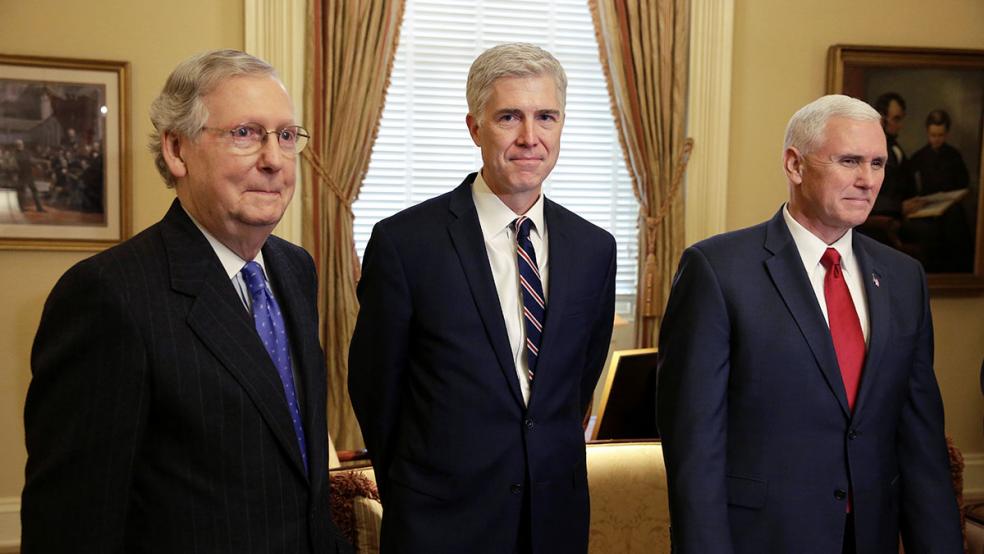“Think of the Supreme Court,” the Republican Party repeatedly urged skeptics of Donald Trump during the general election in 2016. Conservatives who found themselves lost at sea in a cycle dominated by grassroots populism and the tenacious popularity of the billionaire candidate riding its wave fretted whether they would find themselves locked out, regardless of which candidate won the election. Republican leaders and the Trump campaign insisted that conservatives had only one chance left to save the Supreme Court from a progressive takeover, and eventually conservatives cast their bets on Trump.
This week, that bet paid off – and perhaps more robustly than conservatives might have hoped. Trump had long pledged to name his first Supreme Court pick from a list of 21 names, consisting of well-regarded judicial conservatives that had been recommended from sources like the Heritage Foundation and activists with whom the campaign consulted. Still, having been burned in the past on nominees from better-established politicians – such as George H. W. Bush’s appointment of David Souter or George W. Bush’s initial selection of Harriet Miers – many conservatives had low expectations that Trump would stick to his list once the political realities of Washington DC emerged.
Related: The GOP May Get a Taste of Its Own Medicine on Supreme Court Nominations
Instead, Trump fulfilled his campaign promise, even while doing so in a nod to his reality-show past. The president invited his two finalists to Washington but introduced Judge Neil Gorsuch as his nominee. Gorsuch represents precisely what conservatives most want in a Supreme Court justice: conservative, dedicated to an originalist interpretation of the Constitution, and scholarly enough to have a track record of writings that allow supporters to believe that he will remain in the mold of the late Antonin Scalia rather than “grow” in his office – to the Left.
Furthermore, Gorsuch offers the promise of a very long tenure on the bench at his present age of 49. Despite his youth, Gorsuch has spent a decade on the 10th Circuit Court of Appeals after having been appointed by the younger Bush, which gives him an unassailable resumé for the job. In fact, Gorsuch was already such an impressive figure at the time of his 2006 nomination to the appellate bench that Senate Democrats waived a roll-call vote and allowed Gorsuch to be confirmed by universal acclamation
For that reason, Trump’s choice is a stroke of genius that will make it much more difficult to obstruct the confirmation. The Senate still allows for filibusters on Supreme Court confirmations, but Democrats must have 41 of their caucus to sustain one in the event of a floor vote. Despite anger over the blocking of Merrick Garland last year, when Senate Republicans refused to take up Barack Obama’s choice for Scalia’s replacement, Senate Democrats don’t appear to have the numbers to block Gorsuch. A press release from the conservative activist group America Squared on Wednesday notes that eight Democrats have already gone on record supporting a floor vote, which would give Republicans the 60 votes they need to proceed to confirmation by a simple majority.
Related: Potentially Nasty Fight Looms Over Trump U.S. Supreme Court Pick
Nor is this the only victory that conservatives have seen in the first two weeks of the Trump era, or perhaps more accurately, since the election. Having been freed up from the need to overcome filibusters on his Cabinet appointments, Trump nominated serious conservatives in policy posts – Tom Price to Health and Human Services, Betsy DeVos to Education, Scott Pruitt to the Environmental Protection Agency, and Rick Perry to Energy, among others.
His very first executive order on Inauguration Day started the rollback of Obamacare; others soon followed that froze federal hiring, reduced red tape on regulatory burdens on manufacturing, and restarted the controversial Keystone XL and Dakota Access pipeline projects favored by conservatives and unions alike.
Many on the right wondered just how deep Trump’s commitment to the pro-life movement would run. On his first full business day in office, Trump reinstated the “Mexico City” policy that bars federal funds to organizations that promote or provide abortions abroad, and sent Vice President Mike Pence to the March for Life – the first time a sitting vice president has spoken at the 44-year annual protest march against Roe v. Wade.
Related: Trump Would Favor Senate Rule Change If Supreme Court Choice Blocked
During the campaign, Trump would often claim that America would start winning so much that we would get “sick of winning.” Before the first fortnight of his presidency has passed, conservatives – even those who opposed Trump or viewed his potential with significant skepticism – have to acknowledge that they’ve been on a solid winning streak so far, as early #NeverTrump commentator Erick Erickson did. “If you’re a Trump critic from the right and can’t bring yourself to even thank him for Gorsuch,” Erickson tweeted after the Supreme Court nomination announcement, “at this point, you’re just an ill-mannered ass.”
That streak won’t last forever, of course. Trump has plans for infrastructure spending that will generate opposition from fiscal conservatives and deficit hawks, and the pressing need for comprehensive entitlement reform will get back-burnered for at least a few more years. However, Trump has at least established his credibility on honoring commitments to voters, especially with conservatives who only reluctantly rallied to his banner.
That alone will earn Trump maneuvering room on these other issues, and could unite the Republican base more strongly than since the passage of Obamacare seven years ago. And that should have Democrats facing a potential disaster in 2018 worried that their own losing streak will just get longer and longer.






